- Home
- Susan Beth Pfeffer
The Beauty Queen Page 5
The Beauty Queen Read online
Page 5
“You’ll get it eventually,” I said, because it was getting close to time to go to the lake and parade my status as Miss Great Oaks. Actually, there were months when Mom didn’t get it. Those were always bad times because we really did need the money, and Mom would get bitchy about letting us see Dad, which didn’t bother me all that much, but it depressed Marly.
“If the payment had come, we could have used it for a wraparound,” Mom said.
“I don’t think it would have occurred to either one of us,” I said. “Look, I don’t care if you go to this thing, but Greg’s going to pick me up any minute, and we have to figure out what I’m going to wear.”
“Do you have any kind of long skirt?”
“A long dress. That’s all.”
“A long dress? Could you wear it for the county contest?”
“Impossible,” I said. “It would look ridiculous.”
“Okay. Put pants on then, something clean, please, and not torn and patched, and a blouse. And wear your bathing suit under it.”
“Great,” I said. “Then if they want me to, I can do a strip.”
“They wouldn’t ask you to do that,” Mom said, following me to my room. “This is a civic responsibility. And be sure to be polite. I heard that Orville Talbott’s going to be there.”
“Orville Talbott,” I said. “Who’s Orville Talbott?”
“He’s one of the judges for the county contest.”
“What’s he going to be doing here?”
“His mother lives here, and he comes every year. At least that’s what Dr. Hunnicutt said. Dr. Hunnicutt’s an old friend of Mr. Talbott. He said Mr. Talbott favors redheads.”
“How do I look?” I asked.
Mom looked at me. “Not bad,” she said. “Demure but sexy.”
“Demure but sexy is a tease.”
“The only person you ever teased was Marly,” she said. “I don’t think we have to worry about it now. Speaking of which, who told you to have Greg escort you to this thing?”
“Nobody told me. It was my very own idea. He has a car, you know.”
“I know,” Mom said. “Not as well as you do, I’m sure, but I know. What I don’t know is if it’s okay for you to go with your boy friend.”
“I don’t see why not. Greg’s very respectable.”
“His family’s respectable,” Mom said. Mom was very pleased Greg’s family was so respectable. She regarded it as a hope for the future. “Still, Mr. Talbott might think it was serious between the two of you and not vote for you. Couldn’t Lynn take you?”
“I asked. She’s doing lights for a show.”
“They’re having a show on July Fourth?”
“They figure they just might get an audience. So it’s either Greg or hitching, and I have my doubts about hitching.”
“I should think so. Suppose it got out that Miss Great Oaks had to get to the celebration by hitching?”
“Sounds like a juicy scandal.”
“I’ll go with you and Greg,” she announced.
“Mom, do you have to?”
“No,” she said. “But I think it would be nice. You wouldn’t have entered the contest if it hadn’t been for me. I have a right to be there.”
The doorbell rang. “That’s Greg,” I said. “Come on, Queen Mother. We might as well get the show on the road.”
Morris Lake was a jumble of colors when we got there. Even though the sun was just starting to set, they’d turned on a variety of colored lights, which reflected on the lake and made it look like an oil spill. There were a photographer, a reporter, and a lot of kids being chased by harassed parents. I held on to Greg for support as Mom followed us, telling me to stand up straighter. We hadn’t gotten very far before we were accosted by a stranger.
“Kit? Kit Carson?”
“Yeah,” I said. There were times when I wished my father had tagged me with a different nickname.
“I’m Norma Shandell, Mayor McGowan’s secretary. I’m very pleased to meet you.”
“Likewise,” I said. My mother kicked me. “Oh, this is Greg Hoffman, and my mother.”
“Adele Carson,” my mother said.
“I’m very pleased to meet you,” Ms. Shandell said. “Mayor McGowan gave me some instructions for you.”
“I can hardly wait,” I said. Mom kicked me harder.
“First of all, did you bring your bathing suit?” she asked. “It’s traditional for Miss Great Oaks to be here in a bathing suit.”
“I have one on under my clothes.”
“Fine,” she said. “I have the ribbon and the crown for you, in this bag. Why don’t you just take it and go into the dressing room and change.”
“Crown?” I asked.
“It’s just paper, with some gold glitter on it. My daughter did the glitter. She’s seven, and you know how they are at that age. They just love playing with paste. Put the ribbon over your shoulder. You know, the way they have it on TV.”
“And then what do I do?”
“You’ll be introduced, and then you and the mayor will lead the people in singing ‘The Star-Spangled Banner.’ You can sing, can’t you?”
“Not ‘The Star-Spangled Banner,’” I said. “I mean, the notes are so high.”
“Nobody will hear you anyway. Just sing away from the microphone. And then say something nice about Great Oaks, and America, and then the mayor will, and that’s all. Except that it’s nice if you mingle with the people. And they’ll want you to comment on the fireworks.”
“What do you mean comment?”
“Nothing too hard,” Ms. Shandell said. “Just say how pretty they are. There’s a man here from the radio, and he’ll be asking you questions on the fireworks, so you just say how pretty and what nice colors. Frankly, they don’t expect too much from Miss Great Oaks.”
“I think I can handle it,” I said. “I’ll go change.”
It was a very nice ribbon, yellow on purple, which went just beautifully with my navy blue bathing suit. The glitter on the crown was falling off, and some of it slipped under my suit, which made me extremely itchy. I kicked my shoes off and made my entrance.
People actually applauded. I was glad Marly wasn’t there (dieting was giving her headaches, she said. She’d lost three pounds though), and extremely glad Lynn wasn’t there, and very sorry Greg was. Also my mother. It was the kind of moment she was going to hold over my head for years.
Mayor McGowan walked up and kissed me, which I thought was presumptuous of him. I wouldn’t have even known who he was except he was the only one wearing a straw hat with a red, white, and blue band saying “McGowan for Mayor.” I smiled broadly and waved hello to my subjects.
The mayor led me up to the platform we’d used for the contest. This time it was tastefully decorated with flags. My crown slipped over my forehead. I shoved it back, smiling broadly.
The mayor and I then sang “The Star-Spangled Banner.” From where I was, it sounded as if we were the only two people singing it. I depended on the mayor to get me through some of the rougher points, since I’d never really learned the lyrics. Somewhere around “the rocket’s red glare” I lose track of what’s coming. I tried to look patriotic and sexy, which isn’t an easy combination.
“And now,” McGowan said, after we’d all cheered, “this year’s Miss Great Oaks will tell us what the Fourth of July means to her. And, I might add, it’s especially appropriate since our lovely winner’s name is Kit Carson, after the great American hero.”
I smiled and tried, through thought waves, to keep my crown from slipping over my eyes. It didn’t work.
“I’m very proud to be an American,” I said straight into the microphone.
The crowd cheered.
“Especially an American from Great Oaks,” I said.
The crowd cheered some more.
I smiled.
“That was beautifully put,” Mayor McGowan said. “You have a future in politics, my dear. Have you thought about being the first woman Pre
sident?”
“Oh no,” I said, in my best husky stage whisper. “But I’d just love to be the first woman mayor of Great Oaks.” And I smiled.
The mayor laughed and then stopped laughing when I stopped smiling. And then I smiled, and he laughed just a little, and the crowd roared. I sat down, crossed my legs, and forgot to try to look patriotic.
Mayor McGowan had learned nothing about brevity from my speech. His took at least ten minutes, and it was all about the Revolution and how it led to a great Republican administration in Great Oaks. I really felt for Thomas Jefferson and Thomas Paine. Had they known their revolution would result in McGowan, maybe they’d have been Tories instead.
After McGowan’s speech, the bugle corps from the local Boy Scout troop played a medley of John Philip Sousa songs, and the American Legion post leader read a selection of great thoughts from Great Americans. That was what he called it. I personally could think of greater Americans than Charles Lindbergh and Vince Lombardi, but the audience seemed to like it.
Then came the fireworks. I’d always liked fireworks, but I wished I was sitting with everybody else and wearing something warm. It really got cold around Morris Lake on summer nights.
“This is Barry King, coming to you from Morris Lake and giving an eyewitness report of the annual Fourth of July festivities. With me this year is lovely Miss Kit Carson, this year’s Miss Great Oaks. Say hello to the people, Kit.”
“Hello,” I said, and felt like a fool.
“We’ve been promised an unusual fireworks display this year, Kit. Have you heard anything about it?”
“I’m afraid not, Barry,” I said. If he could call me Kit, I could call him Barry. “They don’t divulge state secrets to Miss Great Oaks.”
Barry laughed heartily. I disliked him. “I know the feeling,” he said. “They keep us reporters in the dark too.”
Someone started the fireworks. The first few were just jumbles of colors.
“Lovely,” Barry said. “How would you describe that, Kit?”
“Lovely,” I said. “Reds, yellows, pale ocher. Too bad this isn’t TV.”
“I know,” he said. “That’s what I keep telling my boss.”
There was a technical difficulty then (I think someone dropped the matchbook), and Barry had to think of something to fill the time with. He decided on me.
“You must be thrilled being Miss Great Oaks,” he said.
“Oh yes,” I said. “It was the most exciting thing that’s ever happened to me.”
“I hear your chances for the county contest are very good,” he said. “Rumor has it you’re a shoo-in.”
“I never listen to rumors,” I said.
“Do you think you’ll make it all the way?”
“You mean all the way?” I asked. “The whole schmeer?”
“That was the idea.”
“Never,” I said. “That’s utterly impossible.”
“Why?” he said. “It happens to some girl every year. Why not you?”
It was an interesting question, one I hadn’t asked myself. I’d just assumed it wouldn’t go any further. “I have red hair,” I said after a pause Barry must have hated. “And I’m not from Mississippi. They always give it to girls from Mississippi. And I bite my fingernails.”
Barry laughed. “You’re being much too modest,” he said. “You’re a lovely girl and very talented. You have every chance of winning.”
“Never,” I said, but fortunately before we could resume the conversation, the fireworks started again, and I was able to return to safer subjects.
As soon as I could, I got down from the platform and walked around looking for familiar faces. Greg came with me. Mom stayed in one place and fended compliments. I guess she decided we wouldn’t leave without her except maybe to elope.
There were a few kids there from my high school class, and I felt very embarrassed, like I couldn’t afford clothes and that’s why I was wandering around in a bathing suit (and an ugly one at that). The conversations were strained, but I wasn’t that friendly with anyone who wasn’t in the theater crowd, and since Greg was two years older, he didn’t know them. I was thinking about making a quick exit when I spotted Roger Davalos.
I’d done Anne Frank with Roger, and then he’d taken off for parts unknown to seek his fortune as an actor. I’d seen better actors in little theater, but no one with such a distinctive face. He had oversize features and a small mustache and everything crinkled. Most people’s eyes crinkle when they’re smiling, but Roger’s entire face crinkled all the time. He looked much more likable than he really was, but I hadn’t seen him in over a year, and I was eager to hear what he was doing. So I dragged Greg over.
“Kit, darling,” Roger said and grabbed me. We exchanged hugs, kisses, and introductions.
“Pleased to meet you,” Greg grumbled.
“What’re you doing?” I asked.
“More to the point, what are you doing?” he said. “Really, Kit, I thought you were above this sort of thing.”
“I thought so too,” I said. “Or below it. It was a freak that I won.”
“Just as long as you don’t take it seriously,” Roger said. “What’re your plans?”
“College here,” I said. “Unless something better comes along.”
Roger looked at Greg and crinkled. I did too. Greg frowned.
“What are you doing here?” I said. “The last I heard you were in Denver.”
“I was,” Roger said. “I’m on my way to New York now, to see about doing commercials. I’m signed up with an agency that’s very good at that sort of thing. And while I’m there, I’ll audition for shows.”
“What was Denver like?”
“The city or the theater group?”
“The theater group.”
“Marvelous,” Roger said. “Awful. Every day a different trauma. We had a managing director who thought playwriting began and ended with Shaw. But he was good with Shaw. I learned a lot from him.”
“Why did you leave?” I asked, eager for any news of real theater, of people who earned their living by it.
“I wanted to try other things,” Roger said. “I’m sure after a week of plugging foot deodorant I’ll be yearning for Man and Superman again, but I couldn’t take any more of it. And I wanted to try New York before I’m too old. But mostly it was because the group folded.”
“That could do it,” Greg said.
Roger ignored him. “So much depends on funding,” he said. “The Colorado arts council decided we should be self supporting already, which of course we weren’t. So we all went different ways.”
“Oh,” I said.
“Don’t cry about it,” he said. “We were all in the mood to try other things anyway. And some group in Colorado Springs got an enormous grant to do children’s theater. They have some good people there.”
“Children’s theater?” I said.
“Don’t condescend,” Roger said. “I almost joined up with them myself except their first production is going to be Androcles and the Lion and I couldn’t bear the idea of any more Shaw. You can learn a lot doing children’s shows. You learn to act honestly. Kids won’t take anything else.”
“Do they have any openings, do you know?” I asked.
“Probably late this summer,” he said. “They get a lot of kids for cheap labor, but by fall they need professionals.”
“Kit,” Greg said, in a warning voice.
“That gives me some time,” I said, thinking about doing theater for a living, even children’s theater, even in Colorado Springs. “You can really learn doing children’s theater?”
“It would be good for you,” Roger said. “You’d learn a hell of a lot more than the college here could teach you. Can you do anything besides acting?”
“Make-up,” I said. “Gerry Marks taught me last summer. I’m good at make-up.”
“That they might be interested in,” he said. “Make-up’s a good sellable talent. Especially for kid’s stuff. They just m
ight take you on.”
“Do you really think so?” I said. “I’d give anything to be working for a theater group.”
“They’re called Joy,” Roger said. “Just Joy. Maddy Aronowitz is in charge. If you go out there, tell her I sent you. I don’t know how much weight that’ll carry, but it shouldn’t hurt.”
“Roger, you’re an angel,” I said and gave him a hug. “How long are you going to be in town?”
“Just until tomorrow,” he said. “I couldn’t resist staying for the fireworks, but frankly that’s the only thing worth while in this whole town.”
“Thanks a lot,” I said.
“For giving you a lead?” he said. “Don’t be ridiculous. It’s a lousy life, acting. You never know whether you’re going to eat tomorrow, and you have to take crap from everybody. And unless you’re a star, nobody respects you. But if you’re one of those crazy people who can’t think of any other way to live, the least you can do is help the other crazy people. You’ll do it for me sometime.”
“It was nice meeting you,” Greg said. “But I think Kit’s lips are turning blue.”
“Greg,” I said.
“I have to get going anyway,” Roger said. “It was great seeing you again, Kit. I’ll send you my address as soon as I get settled down. Let me know what happens.”
“I’ll do that,” I said, and we kissed good-by. I walked back with Greg to my mother, who was standing where we left her, holding court. I decided not to mention anything to her that night. Let her enjoy the glory while it lasted.
The evening finally ended, and I blew my last kiss. I walked over to the dressing room and put my clothes on. Someone had stolen my shoes, so I ran out barefoot. I put the ribbon and the crown back in the bag, but Ms. Shandell told me I could keep the crown as a souvenir. The ribbon they’d use again next year. I told her to give the crown to her little girl and tell her someday it might be hers. Ms. Shandell thanked me.
“I was very proud of you,” Mom said, “but you could have been a little nicer to the mayor.”
Greg laughed. “I think she did very well for herself, Mrs. Carson,” he said. “The people seemed to enjoy it.”
“It was an easy fifty bucks,” I said. “Did Mr. Talbott like me?”

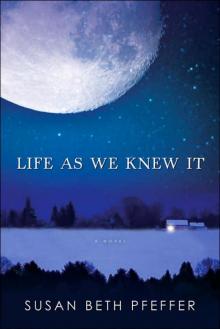 Last Survivors 01 - Life as We Knew It
Last Survivors 01 - Life as We Knew It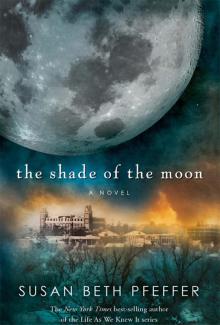 Last Survivors 04: Shade of the Moon
Last Survivors 04: Shade of the Moon Thea at Sixteen
Thea at Sixteen Kid Power
Kid Power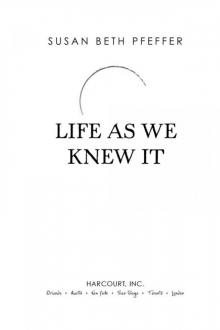 Life as We Knew It
Life as We Knew It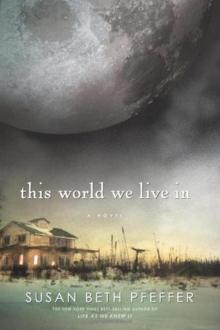 This World We Live In
This World We Live In Meg at Sixteen
Meg at Sixteen Blood Wounds
Blood Wounds The Beauty Queen
The Beauty Queen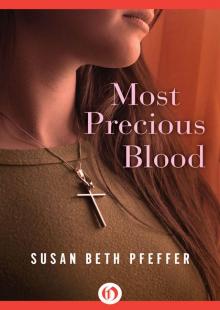 Most Precious Blood
Most Precious Blood The Dead and the Gone
The Dead and the Gone Sybil at Sixteen
Sybil at Sixteen Evvie at Sixteen
Evvie at Sixteen Getting Even
Getting Even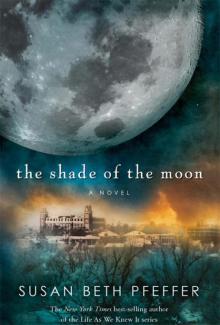 Shade of the Moon ls-4
Shade of the Moon ls-4 The Dead and Gone
The Dead and Gone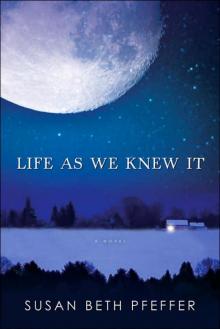 Life As We Knew It lawki-1
Life As We Knew It lawki-1 Fantasy Summer
Fantasy Summer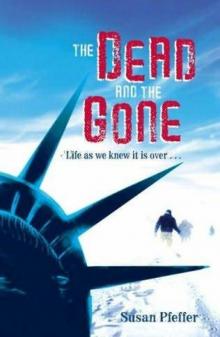 The Dead and the Gone ls-2
The Dead and the Gone ls-2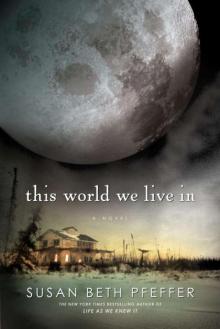 This World We Live In ls-3
This World We Live In ls-3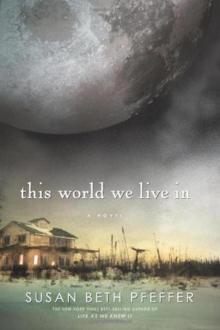 This World We Live In (The Last Survivors, Book 3)
This World We Live In (The Last Survivors, Book 3)